'Why are there no car chargers in my town?'
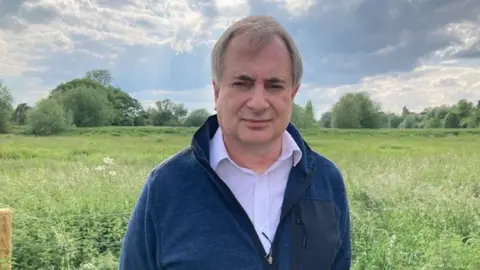 Mark Taylor Stubbs
Mark Taylor StubbsClimate change is a key issue for voters with many people saying greater “urgency” was needed.
Mark Taylor Stubbs, from Sandy in Bedfordshire, claims the roll-out of renewable energy and electric cars was “happening too slowly”.
The 59-year-old librarian got in touch as part of the BBC’s Your Voice, Your Vote initiative and wants to hear more from politicians about their plans for the environment.
“I can’t charge a car at home and there is very poor infrastructure for electric vehicle (EV) charging where I live," he says. "I’m not aware of any public chargers in Sandy.
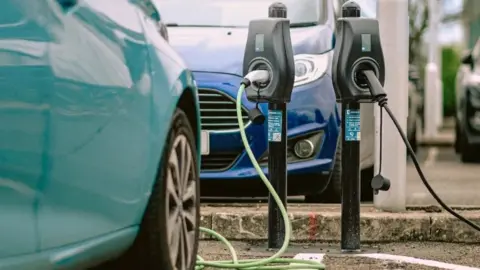 Andy Hughes
Andy HughesThe UK has pledged to reduce its carbon emissions to net zero by 2050, which means no longer adding to the total amount of greenhouse gases in the atmosphere.
But for Mr Taylor Stubbs, 2050 "feels too far off".
We need a greater sense of urgency," he says.
We put his concerns to the candidates standing in his North Bedfordshire constituency.
The BBC is yet to receive a response from the candidates for Reform UK or the Green Party.
Richard Fuller, Conservative
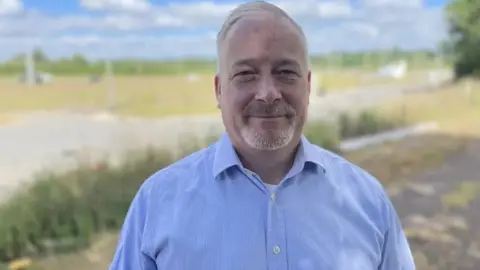 Ben Schofield/BBC
Ben Schofield/BBCRichard Fuller does not support bringing forward the 2050 net zero target.
He says the current 2050 strategy “balances emissions reductions with economic and social considerations”, and points to the government’s £12bn Ten Point Plan.
Mr Fuller says the UK has already reduced emissions by 50% from 1990 levels and “increased its renewable electricity fivefold since 2010”.
He also highlights plans to "expand nuclear power significantly by 2050".
Locally, he supports a green hydrogen service station near Sandy and “a number of appropriately scaled solar farm proposals”. However, he opposes a potential “very large scale solar plant” in North Bedfordshire, “as it would radically alter the nature of the countryside”.
‘A strong climate commitment’
Mr Fuller says while it is down to local authorities to decide car charging locations, government funding of £360,000 had already enabled 88 EV charge points to be installed across Central Bedfordshire.
The council, he says, will be adding standard and rapid charge points to Sandy “this year”.
His party’s target is to install 300,000 public EV charge points nationwide by 2030.
Mr Fuller says the Conservatives' actions "reflect a strong commitment to climate change", adding "it is important that we continue to innovate to ensure we are continuing to use cleaner energy".
Uday Nagaraju, Labour
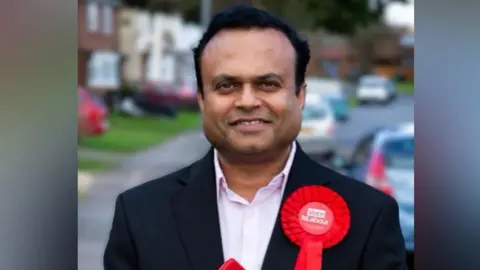 Uday Nagaraju
Uday NagarajuUday Nagaraju says Labour will introduce a “green prosperity plan” to help decarbonise the economy while “investing in our communities”.
He claims the scheme could see 38,000 new jobs created in the East of England.
“We’ve been clear that we need to achieve net zero in electricity generation by 2030 if we are to reach the goal of net zero in 2050," he says.
“We want to make Britain a clean energy superpower."
Mr Nagaraju says Labour’s “Great British Energy” company would “allow us as a country to take control of our energy system”, producing “clean, homegrown power”.
EV charging 'a priority'
“We don’t have enough EV charging points," he says, blaming a lack of investment by “successive Tory administrations”.
“Frustratingly, the available charging points are often not maintained properly and fall out of use," he says adding Central Bedfordshire Council would be installing a charging point in Sandy’s town centre car park.
“I will ensure it is a priority," he says. "I want to see many more installed in the constituency.”
Mr Nagaraju says Labour is “serious about climate change” adding: “Only a Labour government will deliver a decade of national renewal and implement these clean and green policies.”
Joanna Szaub-Newton, Liberal Democrat
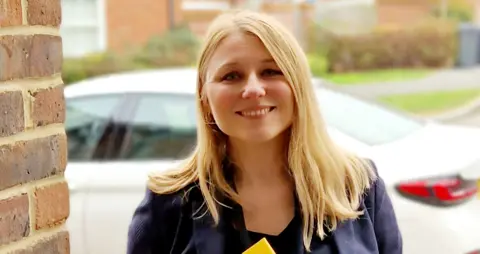 Joanna Szaub-Newton
Joanna Szaub-NewtonJoanna Szaub-Newton says the national net zero target would be brought forward to 2045 under a Liberal Democrat government.
We are in a climate emergency and every moment counts,” she says.
The Lib Dem vision, she says, “isn’t just about reducing fossil fuels – it's about driving economic growth through green innovation”, which includes a strategy for “green pensions”.
The Lib Dems’ plans include boosting renewable energy through increased battery storage, investing in skills and training, and granting "power and resources” to local authorities.
They would aim for 80% of UK electricity to come from renewables by 2030.
'Ambitious approach'
Ms Szaub-Newton points to the Lib Dem’s local track record on climate action, including electric vehicles.
"It's no surprise that Conservative-led councils lag in tackling climate change and EV charging infrastructure," she says.
"In contrast, under former mayor Dave Hodgson and the Liberal Democrat-led council, almost 120 charge-points were installed across Bedford."
She wants to bring the same "ambitious approach" to Sandy, including on-street facilities for residents without private driveways.
“Climate action is at the very core of our mission," she says.
“We recognise that transforming our economy is key, not only to curb emissions but also to create abundant job opportunities."

Poll tracker: How do the parties compare?
Voting: Who can I vote for in the general election?
General election 2024: All BBC stories and analysis
Your Voice, Your Vote: Tell us the issues that matter to you
What really matters to you in this general election? What is the one issue that will influence your vote? Click the button below to submit your idea, and it could be featured on the BBC.
